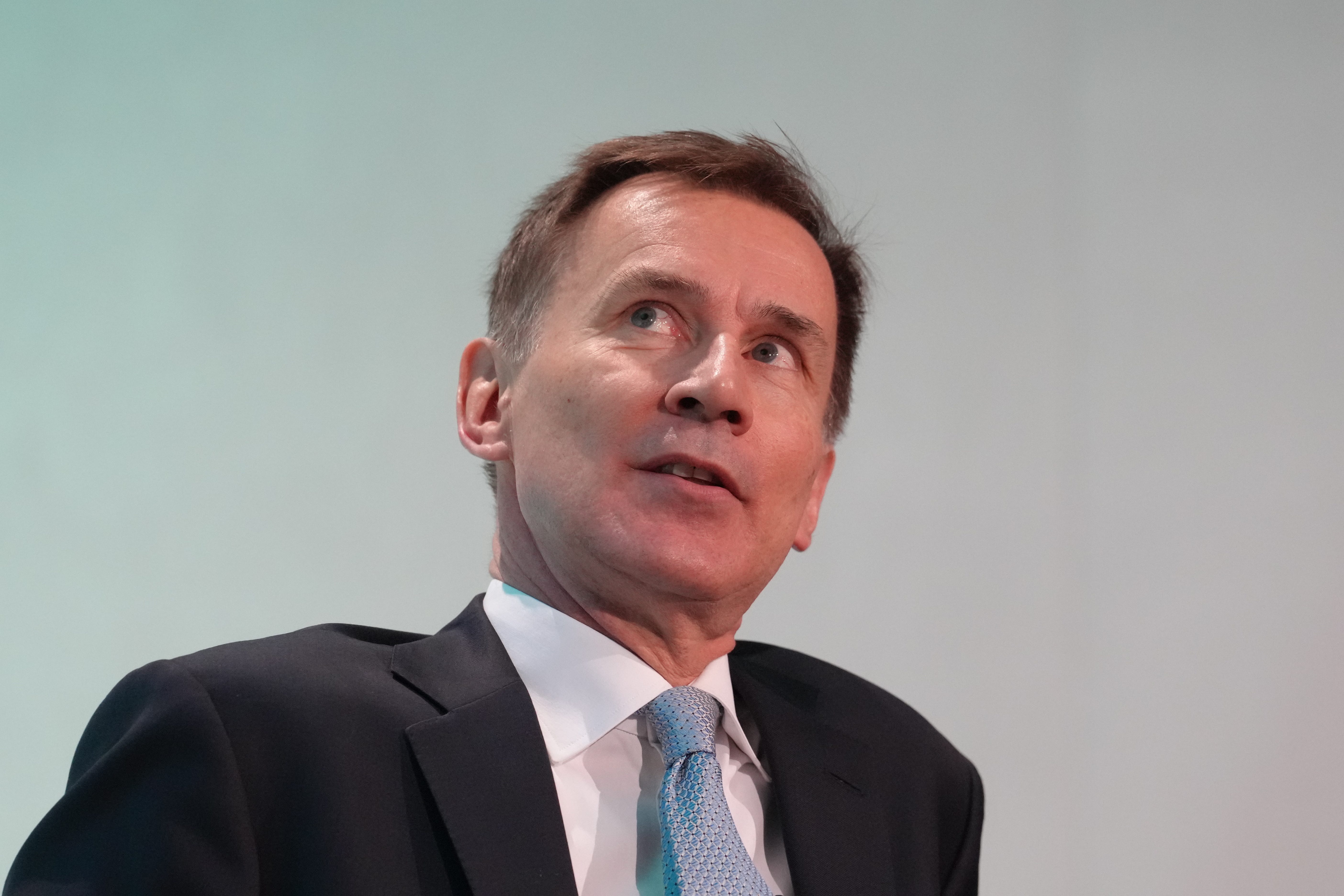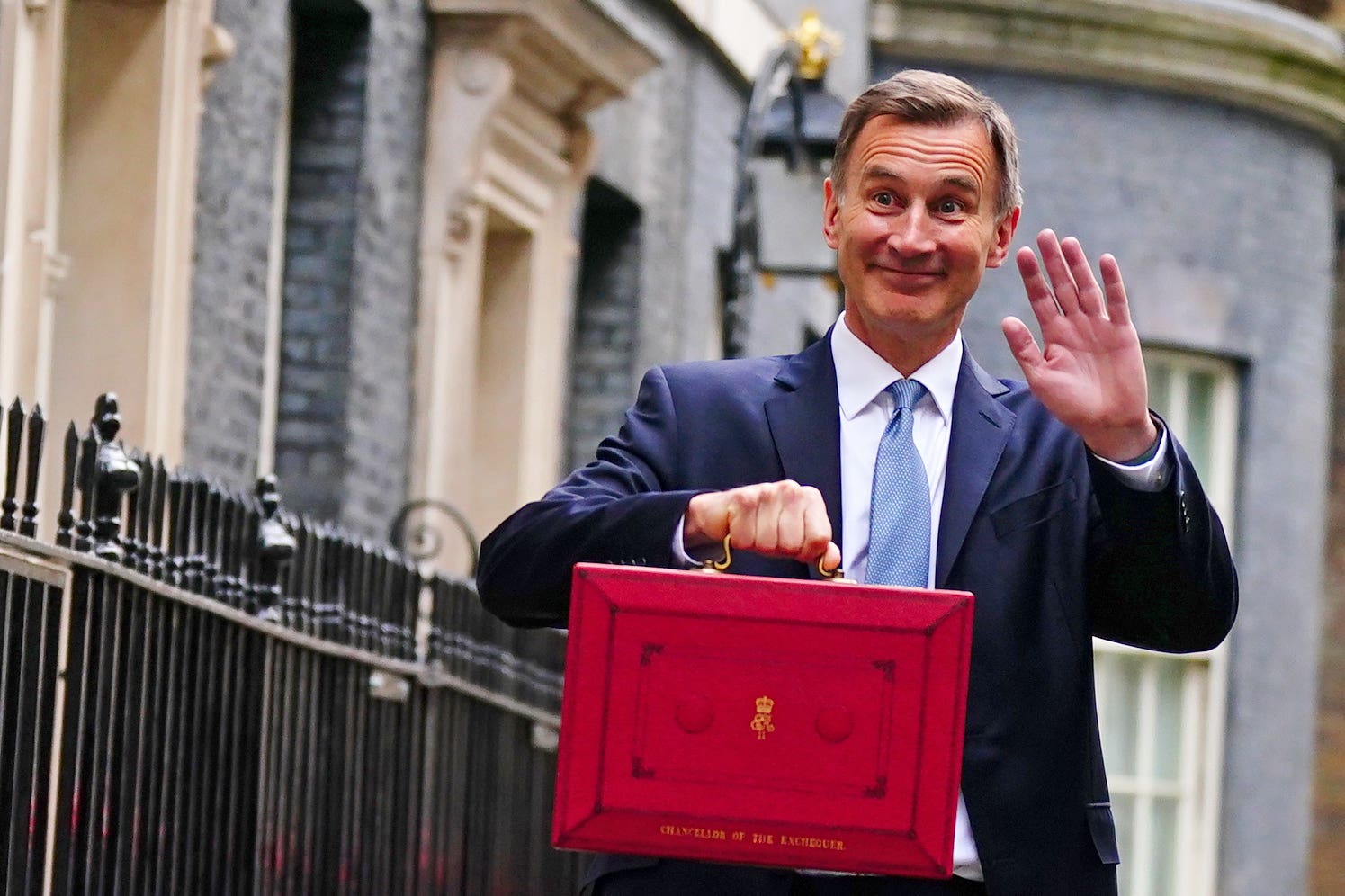Jeremy Hunt downplays prospect of tax cuts in the Budget on Wednesday
The Chancellor said it is a ‘long path’ to reduce the UK’s tax burden, which is nearing record levels.
Your support helps us to tell the story
From reproductive rights to climate change to Big Tech, The Independent is on the ground when the story is developing. Whether it's investigating the financials of Elon Musk's pro-Trump PAC or producing our latest documentary, 'The A Word', which shines a light on the American women fighting for reproductive rights, we know how important it is to parse out the facts from the messaging.
At such a critical moment in US history, we need reporters on the ground. Your donation allows us to keep sending journalists to speak to both sides of the story.
The Independent is trusted by Americans across the entire political spectrum. And unlike many other quality news outlets, we choose not to lock Americans out of our reporting and analysis with paywalls. We believe quality journalism should be available to everyone, paid for by those who can afford it.
Your support makes all the difference.The Chancellor has said he won’t take any risks with the British economy at the Budget as he looked to taper expectations around tax cuts.
Jeremy Hunt said that bringing down the current tax burden is a “long path”, in an interview on Sunday.
He also confirmed that the financial forecasts setting out how much so-called “headroom” he has in order to meet his fiscal rules had “gone against us”, in a move that is likely to curtail his ability to serve up pre-election giveaways.
Mr Hunt is under pressure to deliver tax cuts in what could be the last economic set piece from the Conservative UK Government before the next general election, which is widely expected in the autumn.
The tax burden is reaching record levels, with it expected to rise to its highest point since the Second World War before the end of this decade as the country looks to pay back heavy borrowing used to support people through Covid and the energy spike in the aftermath of Russia’s invasion of Ukraine.
According to The Sunday Times, the Office for Budget Responsibility told the Chancellor on Wednesday that he has £12.8 billion of headroom to play with – more than £2 billion less than the figure the Treasury is said to have previously been basing its calculations on.

The newspaper said the Chancellor is due to meet Prime Minister Rishi Sunak on Sunday evening to make a final decision on whether a 2p cut to income tax is affordable in the Budget.
No 10 and No 11 are said to be weighing up if it is possible to administer such a cut or whether to reduce national insurance contributions further, having sliced it by two percentage points in the autumn statement.
The cut in November did not reduce taxation for pensioners — a key voter demographic for the Tories — as they do not pay national insurance.
Mr Hunt told The Sunday Telegraph that he recognised that Britons had “come to the limit of how high they’re prepared to see their taxes go”.
He said he wanted to bring taxes down, but added: “We’re only going to do so in a responsible way and in a way that supports economic growth.
“The most unconservative thing I could do would be to take risks with public finances.
“If you look at some of the great reforming chancellors, they would cut taxes when they responsibly could.
“But they did not take risks with the economy and I certainly won’t take any risks.”

Asked if taxes would be cut before voters next go to the polls to elect a new Westminster government, he said: “I’m going to be honest with people on Wednesday, that it’s a long path to bring it down.”
The senior Tory is said to be preparing to raise £300 million by changing the preferential tax regime for holiday lets in the Budget.
Another £500 million could be raised by introducing a levy on vapes, according to speculation.
He is thought to be considering abolishing the non-dom status as a potential way of raising revenue.
Non-domiciled status allows foreign nationals who live in the UK, but are officially domiciled overseas, to avoid paying UK tax on their overseas income or capital gains.
Mr Sunak’s wife Akshata Murty has previously enjoyed non-dom status.
While Mr Hunt has in the past resisted the idea of scrapping the status, doing so would likely put pressure on Labour to say how it plans to fund its spending plans for government as it had budgeted a number of policy offers on getting rid of the non-dom regime if it wins the election.
The Treasury announced on the weekend that the Budget will include an £800 million package of technology reforms designed to free-up time for those on the front line of public services.
As part of the Treasury reforms, police will use drones to assess incidents such as traffic collisions and artificial intelligence (AI) will be deployed to cut scan times by a third.
The department said the changes have the potential to deliver £1.8 billion worth of benefits to public sector productivity by 2029.
The Chancellor said: “We shouldn’t fall into the trap of thinking more spending buys us better public services.
“There is too much waste in the system and we want public servants to get back to doing what matters most: teaching our children, keeping us safe and treating us when we’re sick.
“That’s why our plan is about reaping the rewards of productivity, from faster access to MRIs for patients to hundreds of thousands of police hours freed up to attend burglaries or incidents of domestic abuse.”
Darren Jones, Labour’s shadow chief secretary to the Treasury, said the announcement mounted to “spin without substance”.
